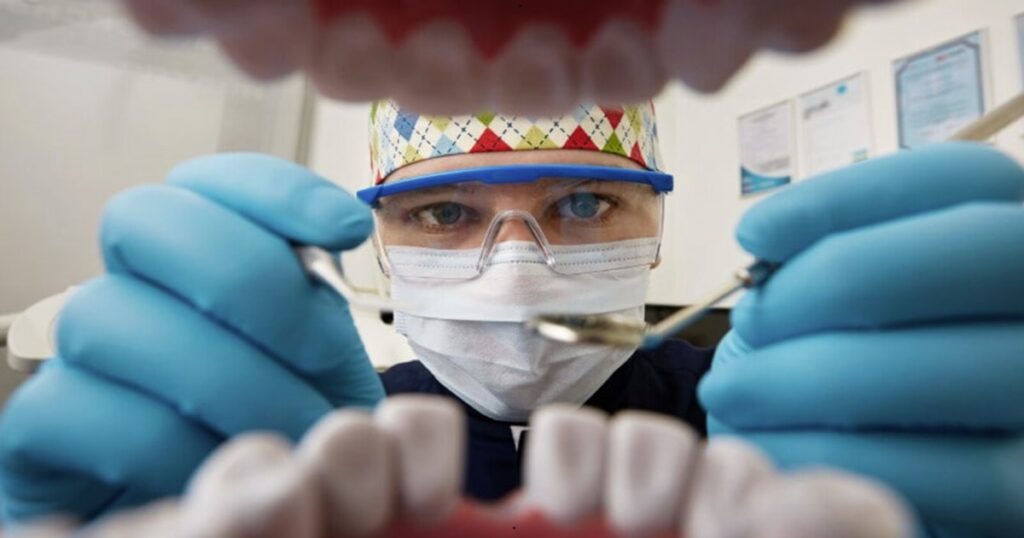Dental implants are one of the most reliable ways to replace missing teeth, offering strength, function, and a natural look. Still, like any surgical treatment, there are risks and complications that can affect the success of an implant. These may range from minor issues such as gum inflammation to more serious problems like nerve injury or implant failure. By understanding the most common risks and how to prevent them, you’ll know what signs to watch for and how to protect your investment in a healthy, lasting smile. Let’s take a closer look at the main risks of dental implants and how they can be managed.
Common Dental Implant Complications
Dental implants are mostly safe and work well, but sometimes there can be issues. Knowing these issues helps you care better for yourself and act fast if you need to.
Osseointegration Failure (Implant not fusing with the bone)
After putting in the implant, the bone should grow around it and join together. But, at times, the implant doesn’t join with the bone, and signs of the implant being turned down show up. Signs include more pain at the spot, swelling, fever, and chills. If this happens, the dentist has to take the implant out. Once the spot heals, they can put the tooth back in.
Infections and Peri-Implantitis
Infections are common after getting an implant, and if not fixed, they can lead to peri-implantitis, a gum issue around the implant, causing bone loss. This often comes from not cleaning well, wrong implant angle, or issues like diabetes and smoking. Based on how bad it is, fixing might need medicine, gum work, or even taking out the implant and adding new bone.
Nerve Damage and Pain
Sometimes the implant might be put too near a nerve. This might cause pain, a pins and needles feeling, or numbness. This trouble gives short-term signs that go away after some time. But, at times, long-term problems show up. The serious nerve called the inferior alveolar nerve is in the lower jaw. Any harm to this nerve is a big deal and needs fast care. Signs of nerve damage include numbness near the implant, mainly by the chin and lower lip, lasting pain or upset, and tingling and burning in the gums.
Sinus Problems (For Upper Implants)
In the back part of the upper jaw, if the base of the implant is too long or there’s not enough bone, it may push into the sinus cavity. This can lead to sinusitis. Usually, a surgery called a sinus lift is needed before the implant. Signs of sinusitis include pain and swelling near the cheeks, eyes, or forehead, a stuffed nose, sinus headache, and fever. If you feel these, see your dentist.
Bone Loss and Implant Instability

If the bone near the implant gets weak as time goes by, the implant may loosen and fail. This issue can be due to too much force, infections, or poor cleaning. This loss can take place slowly and without any pain, and it’s often seen on an X-ray. Smoking, gum issues, and not cleaning well can also cause the implant to loosen. If your implant feels loose, let your oral surgeon know at once.
Why Implants Might Fail
Some health issues and traits can make it more likely for an implant to fail. Knowing about these things before you get treatment can help you choose wisely and dodge problems.
Bad Teeth Care
If you don’t brush, floss, and keep your mouth clean, plaque and germs can pile up around the implant. This can lead to infection, gum disease, and the implant might fail. If the soft parts and bone around the implant get hurt, they can get loose.
Smoking and Diabetes

Smoking cuts down on oxygen to body parts and makes healing slow after surgery. Not keeping diabetes in check can make the body’s defense weak and mess up healing. These two things can make it hard for the implant to work well.
Pre-Existing Gum Disease
If you already have gum disease before getting an implant, it’s likely that the sickness will spread around the new implant and cause infection. So, it’s key to treat all gum problems fully before putting in an implant.
Weak Jawbone
If your jawbone isn’t big or strong enough to hold the implant, the base of the implant can’t blend well with the bone and stay put. In such cases, adding bone or more surgeries might be needed.
Symptoms of Dental Implant Issues
| Symptoms | Possible Issue |
| Persistent or severe pain at the implant site | Inflammation, infection, or failed osseointegration |
| Swelling, redness, or bleeding around the implant | Infection or peri-implantitis |
| Loosening or movement of the implant | Failed bone integration or bone loss |
| Bad breath or pus discharge near the implant | Bacterial infection or poor oral hygiene |
| Numbness or tingling in the lips, cheeks, or tongue | Nerve damage during surgery |
| Pressure or pain in the cheek or sinuses (upper jaw) | Implant intrusion into the sinus cavity |
If you notice any of these signs, it’s important to see your dentist as soon as possible. Early detection can help prevent more serious complications.
Common Short-Term Side Effects of Dental Implants

As with any surgery, different types of dental implants come with some common, short-term effects. Pain is expected, and the teeth around the implant could be a bit wobbly for a couple of weeks before firming up. It is normal to have some swelling and bruising near the site of the surgery, and this will subside in a few days. Some people will experience a brief tingling or numbness in their lip. When the cap is put on the implant, you may feel pressure on your gums or teeth, but that diminishes over time.
When to See a Dentist
Once the implant is put in, the dentist might give you some meds to fight off any chance of getting an infection. You might also get some pain meds from the store or with a doctor’s note to make the pain less.
If you see swelling or get bruises from the implant, these should clear up in a few days after the work is done. But if the pain and swelling last over a week, it’s time to see the dentist again.
Healing at first takes a few weeks, and it might be months before the bone fully joins together. If your implants start to wiggle a bit or keep hurting after a few weeks, you need to get them checked out.
Ready to Take the Next Step Toward a Healthier Smile?
Whether you’re due for a check-up or considering implants, our team at leslienorthdental.ca is here to help. We’ll assess your oral health and guide you through the best solutions, including safe and effective implant options.
Prevention and Aftercare

Earlier, we talked about some things like quitting smoking, managing illnesses, and taking care of your teeth in order to decrease complications with implants. However, the actual care over time is very important to the success of your implant, including:
- Daily brushing and flossing
- Regular visits to your dentist
- Limit your smoking because it can negatively impact healing after receiving your implant
- A mouth guard can protect your implant if you are a tooth grinder while sleeping
- Be mindful of hard foods while healing, and focus on soft foods.
- Care about your general health, like eating healthy foods, sleeping well, and reducing stress
Do dental implants cause cancer?
Many people are concerned that dental implants can cause cancer. But you should rest assured that cancer is not a side effect of dental implants.
Many reputable studies have been conducted in this field, and experts have concluded that there is no difference between people who have previously had malignant cancer and have implants and people who have no history of cancer and have implants. Therefore, implants can be a low-risk option for replacing your missing teeth.
Conclusion
Dental implants provide a durable solution for missing teeth, but it’s important to understand the risks of dental implants, like infection or implant failure. Most complications can be prevented with good oral hygiene, regular dental visits, and early attention to symptoms such as pain or swelling. Maintaining healthy gums and bones is key, so check out our Dental Hygiene & Teeth Cleaning service page to learn how proper care helps your implants last longer.
FAQs
What are the common risks associated with dental implants?
The main risks with dental implants are the implant not joining the bone, infection at the implant site, damage to nerves, sinus issues with upper jaw implants, and bone loss near the implant.
How can I reduce the risks of dental implant complications?
To cut risks, keep your teeth clean, don’t smoke, keep a check on health issues like sugar problems, and see your dentist often.
Is dental implant surgery painful?
You won’t feel pain during the surgery because of the numbing shot, but it’s normal to feel some pain after. This pain can often be handled with pain meds and should get less over time.
How long does it take to recover from dental implant surgery?
Healing starts in a few days to a week, but full joining with the bone might take months (3 to 6).
Can I get dental implants if I have certain health conditions?
Health problems like unchecked sugar issues or bone issues can make it hard for implants to work well. However, with good control of these issues and careful checks by your dentist, getting implants can still be an option. Talk to your doctor about your health before the surgery.
Have you faced any surprises with dental implants, good or bad? Or maybe you’re still on the fence? Drop your thoughts, questions, or even your funniest dentist story in the comments below.



